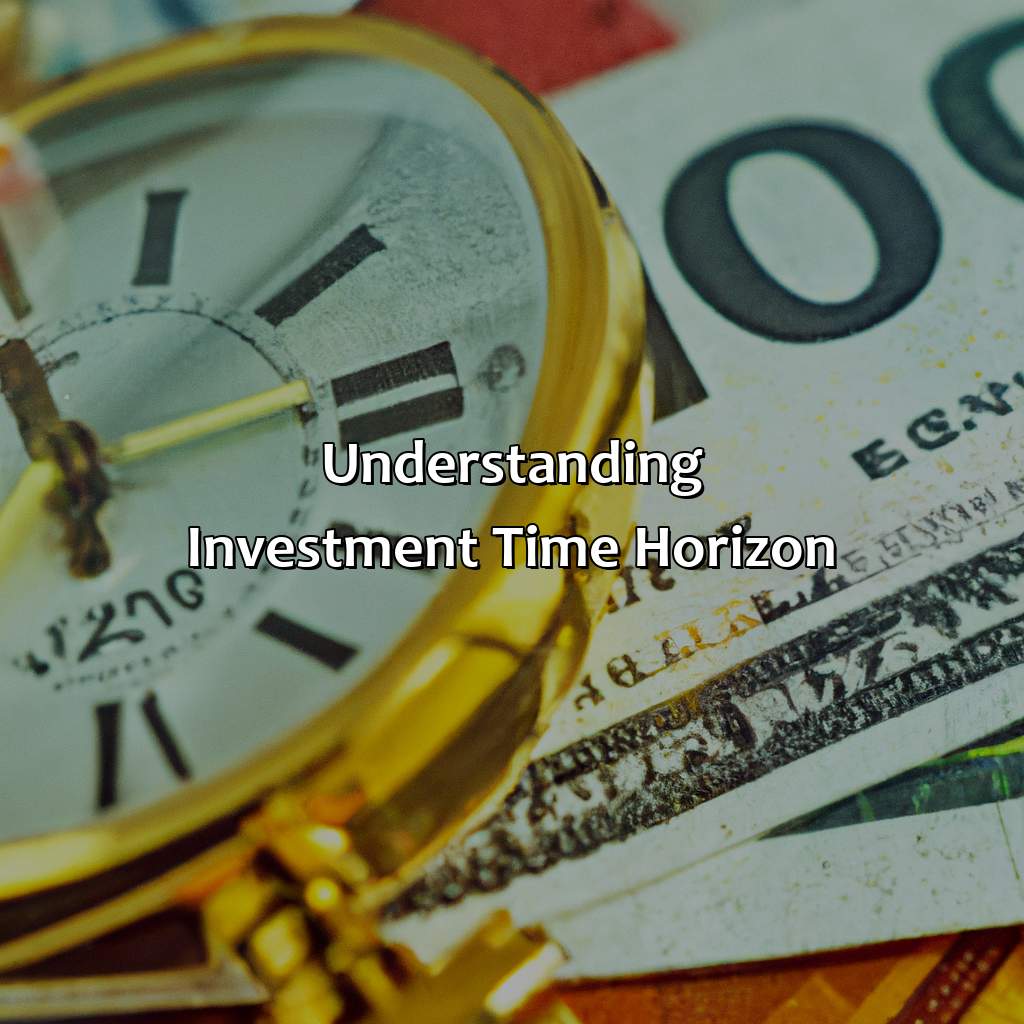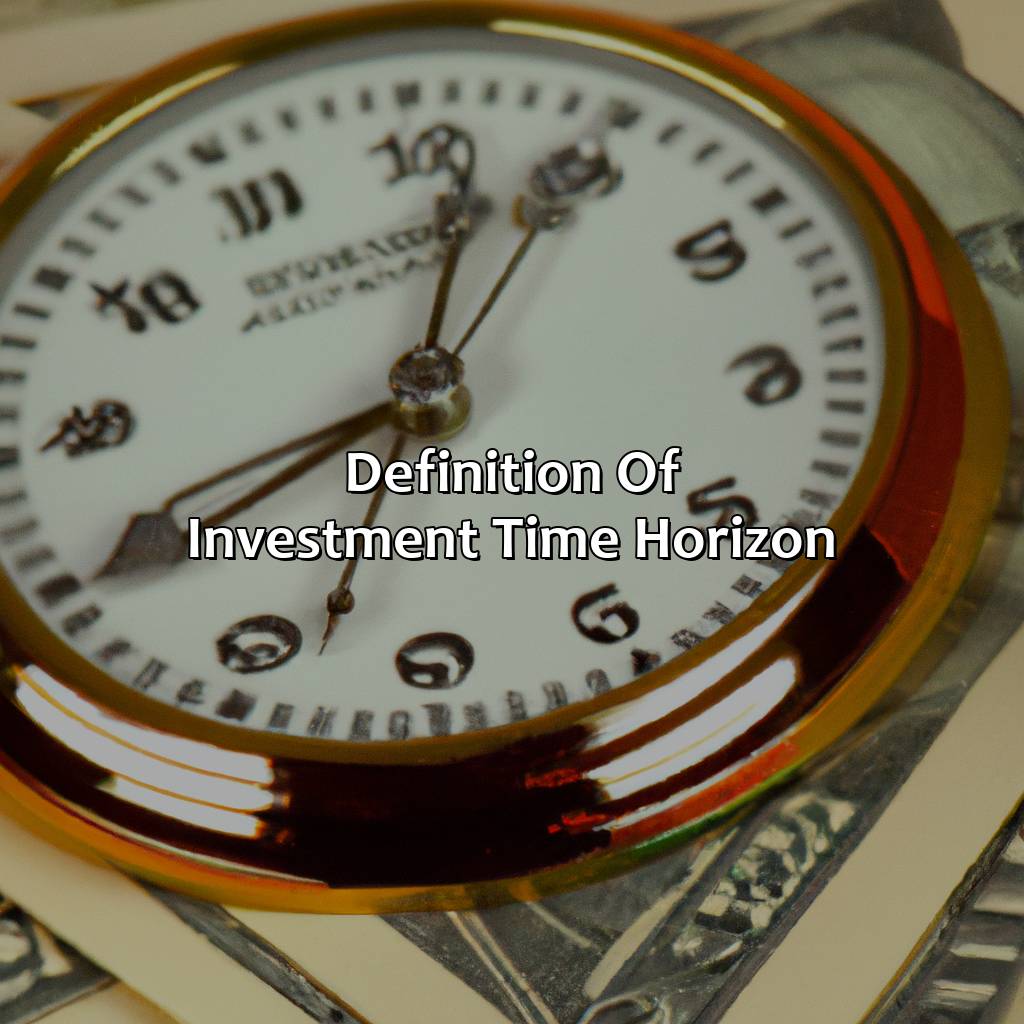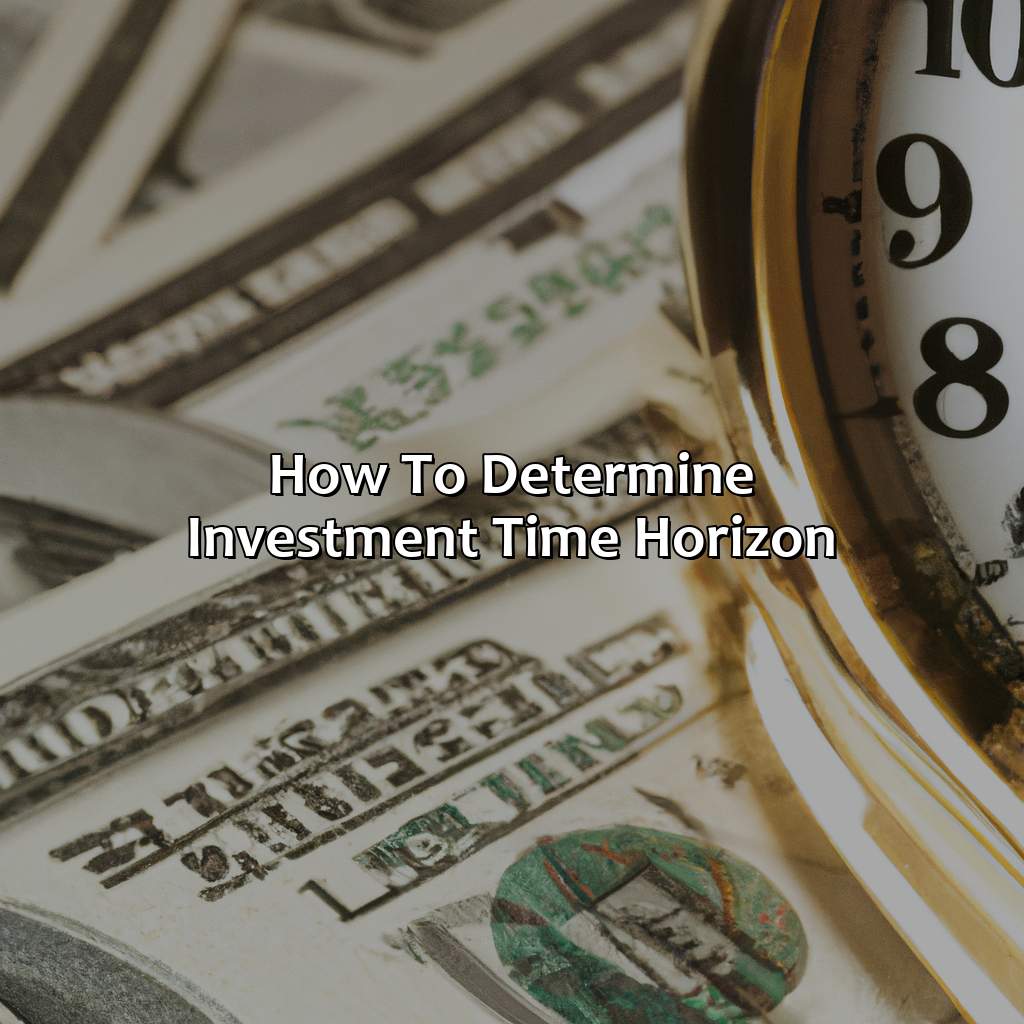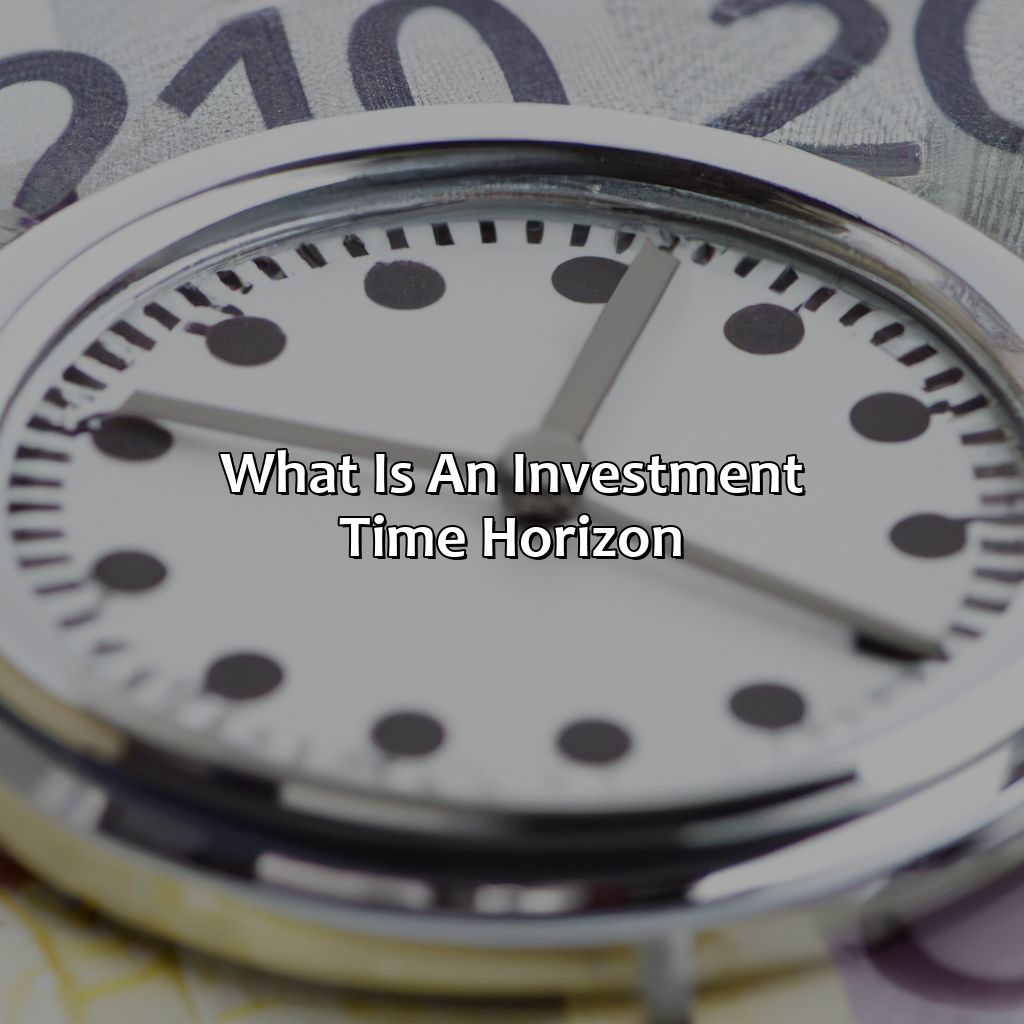What Is An Investment Time Horizon?
Key Takeaways:
- Investment time horizon refers to the length of time an investor plans to hold an investment before selling it.
- Investment time horizon has a significant impact on investment strategy and risk tolerance. Younger investors tend to have longer time horizons and can take on more risk, while older investors may prioritize capital preservation.
- Factors that influence investment time horizon include age, financial goals, and risk appetite. It is important for investors to determine their time horizon through assessing individual circumstances, identifying investment goals, and consulting a financial advisor to develop a well-defined investment strategy.
Are you confused about investment time horizon? If yes, you are not alone! This article provides an informative and accessible guide to understand the concept of investment time horizon and its importance in the investment world.
Understanding Investment Time Horizon
Investment Time Horizon: A Professional Understanding
Investment time horizon refers to the duration of time an investor plans to hold a particular investment before selling it. The timeline varies according to different investment goals, such as short-term or long-term objectives. Investors should consider their risk tolerance and investment strategy when deciding on the optimal time horizon.
When considering investment time horizon, investors must take into account the volatility of the market and the potential for fluctuation. For example, short-term investments require more immediate returns and therefore involve higher risks, while long-term investments aim for steady returns and reduced risk. Consistency in the investment approach is crucial, as changing the strategy frequently may lead to unnecessary risks.
In addition to risk, an investor’s portfolio should also reflect their personal and financial goals. Age, income, and future plans impact the ideal investment time horizon. For instance, a younger investor with a steady income can allocate more money towards long-term investments, while a retiree may prefer short-term investments to secure current income.
Developing a proper investment plan and sticking to it is essential. Without a solid strategy, investors may feel the fear of missing out on new opportunities and make decisions based on emotions rather than logic. A well-crafted investment strategy can help mitigate these emotional responses and lead to a more successful investment journey.

Image credits: retiregenz.com by Harry Jones
Definition of Investment Time Horizon
Investment Time Horizon refers to the number of years an investor plans to hold an investment before selling it. It is the duration between purchasing an investment and its maturity or sale. It is an important factor in shaping investment strategies, as it affects an investor’s risk tolerance and return expectations. The investment time horizon can be:
- Short-term (less than three years)
- Medium-term (from three to ten years)
- Long-term (more than ten years)
The longer the investment time horizon, the greater the potential for higher returns, but also the higher the risk. A longer investment time horizon enables the investor to weather market fluctuations and benefit from long-term growth potential. It also allows them to invest in high-risk-high-reward assets like stocks. On the other hand, a short investment time horizon necessitates investing in low-risk-low-reward assets like bonds.
Age, financial goals, and risk tolerance are key determinants of investment time horizon. A young investor with a longer time horizon can handle higher risk, while an older investor nearing retirement may be inclined towards more stable investments.
An investor should consider their investment time horizon before choosing an investment vehicle or portfolio. Investing in a short-term financial goal using a long-term investment vehicle may result in losses due to market volatility and inflation. It is essential to regularly assess and adjust investment decisions based on changes in financial goals and investment time horizon. To ensure investment success, an individual must prioritize education, follow a disciplined approach, and seek professional guidance.
Investment time horizon is a critical aspect of investing, and adequate knowledge of this concept is essential for effective investing. Missing out on understanding an investment time horizon is like boarding a train without knowing the destination. So, educate yourself and start investing today to achieve your financial goals.

Image credits: retiregenz.com by Yuval Washington
Importance of Investment Time Horizon
It’s important to understand the importance of having an investment time horizon. This affects your overall strategy and risk tolerance levels. To make smart investment decisions, you need to know how it impacts these aspects. We will look at this more closely to give you a better understanding. Your investment time horizon plays a key role in your investment strategy.

Image credits: retiregenz.com by Adam Woodhock
Impact on Investment Strategy
The length of investment time horizon is a crucial factor that impacts the investment strategy. Investors who are planning to invest for short or medium-term have different considerations as compared to those who are planning for long-term. Shorter time horizons necessitate focusing on higher liquidity, lower risk investments, and diversification while longer-term horizons allow one to take in more ground level, higher-risk investments. A strategic approach can help in achieving optimal returns depending on the time horizon of the investment.
Having a clear understanding of the investment time horizon allows one to plan their portfolio accordingly. For a shorter horizon, it may be appropriate to invest in fixed deposits or bonds whereas equity investments may yield results over long-term horizons. A well-researched and sound decision taken according to the length of time invested can bring better outcomes rather than making impulsive decisions without considering the time frame.
Investment choices should be guided by both short- and long-term goals. Considering factors such as potential returns, inflation rates, overall market volatility, and future cash flow needs along with the expected investment period is essential. Such robust planning assists investors in avoiding hasty judgments which can lead to missed opportunities.
I may not be a risk taker in my personal life, but when it comes to investing, I’ll take a gamble – with a safety net, of course.
Impact on Risk Tolerance
Understanding the Relationship between Investment Time Horizon and Risk Tolerance
The relationship between investment time horizon and risk tolerance is quite significant. A longer investment time horizon can help increase the overall risk tolerance of an investor. By having a long-term perspective, investors can ride out short-term market fluctuations and remain focused on their financial goals. This allows them to take on greater investment risks in exchange for potentially higher returns over the long haul.
Moreover, a shorter investment time horizon can lead to lower risk tolerance as it limits the ability of an investor to recover from market volatility. In such cases, a more conservative investment strategy may be appropriate to ensure that one’s financial goals are not derailed by short-term market movements.
Investment time horizons differ across individuals, industries and other factors – they range from months to decades; making it critical for an individual or organization to identify the appropriate investment horizon that is well suited for their desired outcome.
It has been reported that many novice investors make hasty decisions based on short-term news headlines or rumors instead of employing a rational, fact-based approach towards investments.
Whether it’s your age, financial goals, or the impending robot apocalypse, there’s no shortage of factors that can impact your investment time horizon.
Factors Affecting Investment Time Horizon
Discover how ‘Age, Financial Goals, and Risk Appetite’ impact your investment time horizon. Explore this section to gain insight. This will help you decide: how long should you invest? How much risk can you take? What targets do you need to hit?

Image credits: retiregenz.com by David Woodhock
Age
Investment time horizon varies with the passage of time. Younger people tend to invest for a longer period, so their investment horizon is more extended compared to elderly individuals. They can choose to take the riskier path of investing in volatile markets and achieve greater returns using their lengthy horizon.
As an individual ages, the investment time horizon becomes shorter. Therefore, they may want to consider less risky investments that offer lower returns but are more stable and secure.
It is important to note that age does not only influence investment time horizons; there are other factors such as financial goals, risk tolerance and market conditions that play a significant role in determining one’s investment strategy.
Studies have shown that women tend to have longer investment horizons than men due to their life expectancy, which is higher than men. Thus women should bear this in mind when choosing their investment portfolio.
According to Investopedia, “Historically, stocks have generated higher returns over more extended periods compared to bonds or other fixed-income securities“.
If your financial goals are to become a millionaire, just remember: no one ever became rich by investing their money in lottery tickets.
Financial Goals
Financial goals are crucial aspects of investment. Proper financial planning helps determine the appropriate investment horizon for an individual or entities that decide their tolerance for risk and other influencing factors. Investment time horizon is one such contributor that impacts the final outcome.
Investment time horizon refers to the duration for which an individual or entity intends to invest in a particular instrument. It varies based on personal objectives, overall market conditions, liquidity requirements, age parameters and others. Typically, short-term investments have low risk tolerance while long-term investments experience higher volatility but potential for higher returns.
While determining the investment horizon, an essential aspect is understanding various life stages; it guides the investor towards prioritizing goals and making feasible financial targets accordingly.
Different people have multiple reasons for their investment decisions leading to diversified approaches and results.
According to Forbes, “The average holding period for a corporation’s stocks decreased from eight years in 1960 to two years in 2020.”
Remember, a high risk appetite can lead to big rewards, or a really big regrettable mistake, but at least it’ll make for a great story to tell at dinner parties.
Risk Appetite
Investment Risk Tolerance
Your investment risk tolerance determines the amount of uncertainty you are willing to tolerate when it comes to investing. It refers to the level of discomfort that comes with potential losses in your investments. The higher your risk tolerance, the more open you are to taking on risky investments that can potentially lead to significant returns.
When considering your investment time horizon, it is important to take into account your risk tolerance. If you have a low-risk tolerance, then a shorter investment time horizon may be more suitable for you. On the other hand, if you have a high-risk tolerance, then you may be comfortable investing in longer-term opportunities with higher potential returns.
It’s worth noting that investment time horizons can differ depending on individual investor goals and circumstances. Factors such as age, financial status and objectives can all play a role in determining an appropriate time horizon.
One way to assess your risk tolerance is by performing a self-assessment questionnaire designed for investors. This will help determine your comfort level with different types of investments by asking questions about your investment goals and experience.
Figuring out your investment time horizon is kind of like trying to predict the weather – you can make an educated guess, but you’re never really sure until it happens.
How to Determine Investment Time Horizon
Assess your individual circumstances.
Identify your investment goals.
Consult a financial advisor.
These steps will help you decide how long you want your investments to work for you. This plan depends on your personal situation and financial objectives.

Image credits: retiregenz.com by Yuval Woodhock
Assessing Individual Circumstances
Evaluating Personal Scenarios for Investment Time Horizon
Determining investment time horizon is key to an investor’s success. One must consider several factors, including age, financial aims and objectives, and general investment strategy.
For a risk-averse investor looking for safe steady returns, avoiding short term investments works better. Whereas younger investors may want to take bigger risks in the short term and invest in volatile stocks without worrying about immediate gains.
It is equally important to consider market trends while factoring in one’s personal circumstances. Bear markets should influence decision making on a short-term horizon, with interest rates and potential returns having a big impact as well.
Pro Tip: Determine your investment time horizon by realistically evaluating individual situations and balancing goals with the level of risk that suits you best. Identifying investment goals is like choosing a partner – you want a long-term relationship, but also flexibility in case you change your mind.
Identifying Investment Goals
Investment Objectives Determination
When making investment decisions, it is essential to identify specific goals. This allows you to make investment choices based on your requirements and establish your priorities. By determining the objectives you wish to meet, you can select investments that best fit your needs.
Furthermore, setting correct investment goals lets you know where you are headed and come up with an adequate plan of action to achieve them. You may set goals like earning returns over a particular period, producing a regular income with minimal risk or preserving wealth.
Having identified these goals, you can then establish and prioritize various investment options available, selecting among stocks, mutual funds, bonds, or other assets. Once these options are ranked in accordance with your goals and concerned time frame, the final decision should be made after thorough analysis.
Understanding market risks and factors that affect different types of investments is equally important to reaching desired returns. Overall, when choosing investments for varying investment objectives consideration not only has to be provided to investment performance and convenience, but also efficiency in tax obligations.
Consulting a financial advisor is like seeing a therapist – except you’re paying them to tell you what to do with your money instead of your feelings.
Consulting a Financial Advisor
When seeking guidance on determining the right investment time horizon, consulting with a professional financial advisor is recommended. An advisor can help evaluate your current financial situation, understand your future goals and objectives, and suggest a customized plan that suits your needs. They bring insights to find investment opportunities for long-term wealth-building and meet specific goals.
Moreover, an advisor can also assist in balancing risk and return according to your preference, thereby defining how long you should remain invested in the market. Seeking counsel from advisors ensures you invest wisely while minimizing tax liabilities, maximizing earnings, and maintaining a formidable rate of returns.
Pro Tip: Research on different advisors before choosing one that suits your preferences; having clear expectations upfront can set you up for more successful investments.
Five Facts About Investment Time Horizon:
Investment time horizon refers to the length of time an investor plans to hold a particular investment. (Source: The Balance)
The investment time horizon can vary depending on the investor’s goals, risk tolerance, and financial situation. (Source: Investopedia)
A long investment time horizon allows for a higher degree of risk, potentially resulting in higher returns. (Source: Forbes)
Short-term investment time horizons are typically associated with more conservative investments, such as cash or bonds. (Source: Fidelity)
It is important to reassess and adjust your investment time horizon periodically to ensure alignment with your current financial goals and situation. (Source: Schwab)
FAQs about What Is An Investment Time Horizon?
What is an investment time horizon?
An investment time horizon refers to the duration of time an investor plans to hold an investment before selling it. It is the period between the time an investor invests money and the time they intend to realize returns on that investment.
Why is an investment time horizon important?
The investment time horizon is important because it helps investors determine the type of investments to make based on their goals, risk tolerance, and liquidity needs. A longer investment time horizon allows an investor to tolerate more risk and invest in assets with higher potential returns. A shorter investment time horizon, on the other hand, may require an investor to prioritize liquidity and stability over returns.
How do you determine your investment time horizon?
Investors can determine their investment time horizon based on their financial goals and life circumstances. Some factors to consider include the investor’s age, financial obligations, and retirement plans. A financial advisor can help an investor determine their investment time horizon and recommend appropriate investment strategies.
What are some investment options based on an investment time horizon?
Investors can choose from a wide range of investment options based on their investment time horizon. Longer-term investments include stocks, bonds, real estate, and mutual funds. Shorter-term investments include savings accounts, money market accounts, and certificates of deposit. The type of investment a person chooses will depend on their investment goals, risk tolerance, and liquidity needs.
Can an investment time horizon change?
Yes, an investment time horizon can change based on an investor’s changing financial goals and circumstances. For example, if an investor’s financial goals change from short-term to long-term, they may need to reevaluate their investment time horizon and adjust their investment strategy accordingly.
What factors can affect an investment time horizon?
Several factors can affect an investment time horizon, including changes in an investor’s financial goals, liquidity needs, and risk tolerance. Life events, such as marriage, children, and retirement, can also impact an investment time horizon. A financial advisor can help an investor evaluate these factors and adjust their investment strategies accordingly.
 Checkout this IRS Loophole
Checkout this IRS Loophole 
